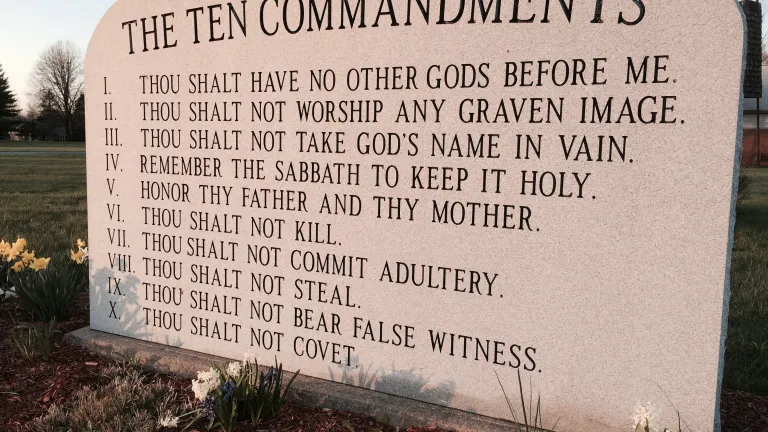Deuteronomy 4:44-5:33
Review of God's commandments and the people's reaction
The Decalogue Repeated
Moses repeats the Ten Commandments to the younger generation. Comparing this chapter with Exodus 20, we see that God inspires Moses here to give an additional reason for keeping the Sabbath—“remember that you were a slave in the land of Egypt, and the Lord brought you out from there by a mighty hand and by an outstretched arm; therefore the Lord your God commanded you to keep the Sabbath day" (Deutereonomy 5:15). So the Sabbath not only reminds us that God is our Creator, but it also points to Him as our Redeemer—the One who delivers us from spiritual Egypt, i.e., the dominion of Satan, society and our own sinful nature. The Sabbath day, then, signifies freedom and reminds us that we should share this freedom with everyone who is within our care and under our control (verse 14). Of course, heads of households must exercise great wisdom in this area when it comes to wives and houseguests who do not share the same beliefs.
The Fifth and Tenth Commandments also have wordings slightly different from those in Exodus 20. Notice the words "as the Lord your God has commanded you" in the Fourth and Fifth Commandments. These are not ten suggestions, and it's interesting that God emphasized this concerning these two commandments when He inspired Moses to restate the Ten.
The fifth commandment is stated very positively, adding not only the same blessing for obedience promised in Exodus 20—“that your days may be long...in the land"—but also the words "that it may be well with you." Obedience to this commandment is essential to maintain healthy families, which are one of the foundations of a stable society. The lack of proper esteem and respect for parents is one of the reasons that families in Western nations are in sad shape. World magazine recently reported, "A respected seminary professor [suggested] that the very concept of fatherhood may 'now be passe' for a high proportion of young people" (May 25, 2002).
In the Tenth Commandment, "wife" and "house" are in opposite order in the two versions, and Deuteronomy adds "his field." The reason for that addition may be that no Israelite had a field of his own for 40 years after the Exodus, but now they were about to gain fields in the Promised Land. Realizing the Tenth Commandment prohibits coveting, it is interesting to consider Colossians 3:5, which tells us that covetousness is idolatry. Thus, the Tenth Commandment links right back up with the First Commandment. In this way, the Ten Commandments make a complete circuit.
"Face to face" in verse 4 does not mean the Israelites actually saw the face of God (see Deuteronomy 5:5, Deuteronomy 5:22-23; Deuteronomy 4:12, Deuteronomy 4:15). Even Moses did not see His glorious face. The expression implies close proximity—being confronted with God's obvious presence—and God's speaking to them on a level they could understand.
People accuse God of hiding from them, but in verses 23-27 we see man's proclivity to hide—or at least keep his distance—from God. Of course, God mercifully understands (verse 28), and He expresses His longing for the time when they would have "a heart in them" to properly fear and obey Him (verse 29). A heart can be spiritually converted only when God gives the gift of the Holy Spirit (Romans 8:5-10; Deuteronomy 29:4).
Supplementary Reading: First question and answer (regarding which commandment is which), "Questions & Answers,"; The Good News, July-August 2002, p. 31.




Beyond Today Bible Commentary: Deuteronomy